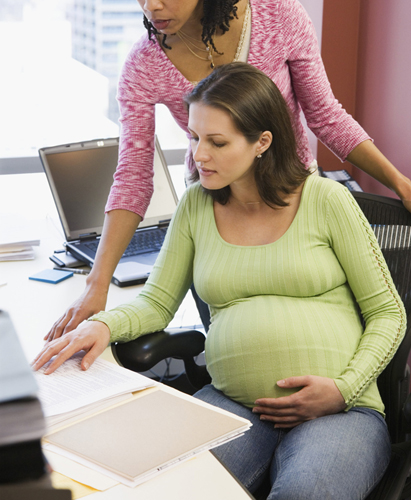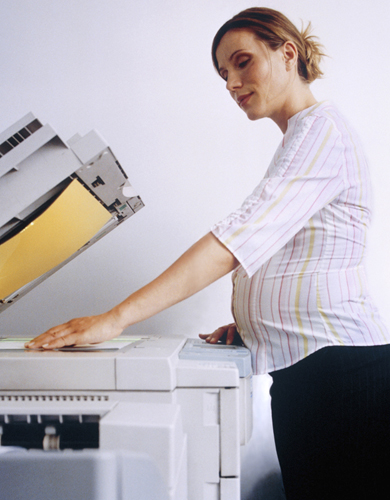Managing outside home Your life at work
Women currently comprise
46 percent of the 137 million workers in the US. The need to contribute
to the family and to the community as well as financial concerns often
require that pregnant women work outside the home. In addition, women
need to keep skills current and continue professional lives. They may be
saving up leave time for those important weeks and months following the
birth of their baby. Pregnancy can be an extremely healthy period of
your life since you are keenly aware of your body's need for additional
sleep, a quality diet, and a change in lifestyle.
Pregnancy in the workplace—when to tell, who to tell, and how
Some women prefer to
wait until the second trimester to tell all of their colleagues but this
is a personal decision and depends upon many factors. If your employer
requires a lot of lead time to arrange for coverage of your
responsibilities, it may make sense to inform your supervisor early in
the pregnancy. Some mothers prefer to wait until the risk of miscarriage
is low before announcing the news at work or even to their friends.
However, if something should happen, you will need the support of good
people to help you at work and to provide you with support at home. Your
instincts and experience will help you make this decision.
Dealing with nausea at the office—how to manage
Try every trick to
relieve the nausea. Often, getting something into your stomach
(sweetened rice, soda, graham crackers, ginger tea, warm milk, or herbal
tea) is very helpful in stabilizing your stomach before you begin to
move around. Delay teeth brushing and avoid rushing too much after
rising. If vomiting is imminent, try putting pressure on an acupressure
point at the inside of your arm just up from your wrist. You can feel
the spot 3 fingerbreadths above the wrist crease, between two tendons.
Press down firmly and massage this spot with your thumb. Continue for 5
minutes. If no self-help techniques seem to work, bring a plastic bag
tucked into a baby wipe container for emergencies. Scout out a quick
route to the nearest restroom. Deep breathing will often help and keep
swallowing.
Your pregnancy and a physically demanding work environment
How you will deal with
this depends upon the nature of your work, your general state of health,
and that of the pregnancy. There is confirmed evidence that exposure to
stress, long hours standing, excessive noise, and certain chemicals
represent hazards to your baby. The National Institute for Occupational
Safety and Health has guidelines for safety in the workplace during
pregnancy. They publish “The Effects of Workplace Hazards on Female
Reproductive Health” that describes the effects of viruses, ethylene
glycol, carbon disulfide, lead, radiation, and physical labor. In
general, however, if you feel that your health or that of your baby is
endangered by your job, you should inform your employer right away. You
may be able to receive a transfer to a position that is less hazardous.
Make sure to express the need to take breaks during your workday
It is important for
you and your employer to recognize the well-documented negative effects
of prolonged standing and stress in the work place. Your midwife or
physician can write a note explaining the importance of breaks and a
lunch period where you can rest and get your feet up. If your co-workers
need to work harder when you take breaks, this might have to be worked
out with your employer.
Know your work environment—chemical exposure in pregnancy
Some women are
hypersensitive to odors. Volatile chemicals, however, may be hazardous
to your health and that of your baby. Exposure to toluene, acetone and
Perchloroethylene, a dry-cleaning solvent, can cause kidney, liver, and
central nervous system damage, and even miscarriage. Fumes from paint,
glue or new carpets may also cause nausea and light-headedness so avoid
such areas for a few days. Regardless of how many hours you work or how
long you've been employed, you are entitled to safe working conditions.
The Occupational Safety and Health Administration requires employers to
provide a workplace free of hazards, while the Pregnancy Discrimination
Act (PDA) requires employers to treat pregnancy as they would any other
medical condition, with the same disability leave and pay. The PDA also
makes it illegal to hire, fire, or refuse to promote a woman because she
is pregnant. Your human resources department can provide you with
additional information.
Working through
You can work until late in your pregnancy, but it's wise to allow
yourself some time off before the birth to have a break and relax.

If you spend much of the day desk-bound, try to get up and move
around regularly, even if it's just a walk to the photocopier, to avoid
sluggish circulation.

If your job involves standing for long periods of time, you may
need to build in regular breaks toward the end of pregnancy or find ways
to rest while working.

If you work with substances, make sure your employer has done a
risk assessment and that you are aware of anything you should avoid.
